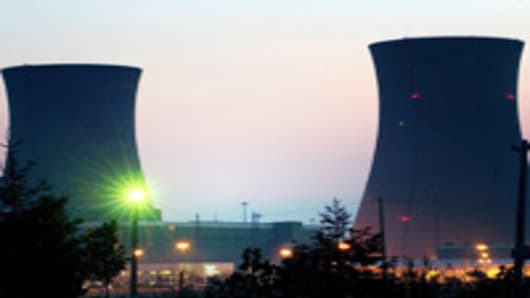California wants to go green. However, it does not want to go nuclear.
There's been a moratorium on building new nuclear plants in the Golden State since 1976. The two remaining operational plants, PG&E's Diablo Canyon and Edison's San Onofre, are both along the coast and near earthquake faults.
Both have gotten new attention since the quake and tsunami in Japan caused major damage to the Fukushima Daiichi plant, but neither California facility has ever experienced serious problems due to natural disasters. Yet.
One of the reasons for the moratorium is the lack of a permanent disposal site for nuclear waste in the U.S. Currently, the waste is held on site, as operators wait for the federal government to develop a final dumping ground, since killing funding for the proposed Yucca Mountain Nuclear Waste Repository in Nevada.
Now, a French company is gambling it can beat the odds and build a nuclear plant in the heart of California's fertile farmland. Areva, which is controlled by the French government, has partnered with a group of California businessmen and farmers who've formed the Fresno Nuclear Energy Group.
They've started the permitting process for a 4,000-watt clean energy park near Fresno which would include two 1,600-megawatt nuclear reactors. The remaining 800 megawatts of power would come from wind and solar thermal power on site. The partners want to put the multi-billion dollar facility amid some of the most productive agricultural land in the country.
"There's an old expression in the nuclear business," says John Hutson, President and CEO of the Fresno Nuclear Energy Group. "The more you know about nuclear, the less you'll fear it, and the more you know about global climate change, the more you'll fear it."
He and his Fresno partners have put in hundreds of thousands of dollars of their own money to try to get the ball rolling. It may be rolling uphill.
First, there's the problem of the moratorium because of no permanent waste site. Areva says it can ship the Fresno nuclear waste to France, as it does for other customers, where it would be recycled.
But the company admits France won't keep the leftovers. That so-called "residual waste" would be shipped back to the U.S. "That material will be glass, which means it will be more resistant to environmental forces," says Areva's Jarret Adams.
Still, there would be no place in the U.S. to store it. Adams hopes that by the time any plant is built and any used rods need long-term storage, the U.S. will have come up with a solution.
John Hutson thinks he has an argument to avoid the moratorium altogether. "If we're not making electricity, the moratorium has nothing to do with us," he says. Hutson claims the power generated would be used to desalinate water, not power customers on the grid. "There's currently no law in California that says you can't use nuclear power for industrial purposes to create steam."
"You could put lipstick on a pig, but it's still a pig," says Fresno County Supervisor Henry Perea, who isn't buying branding efforts that call the plant a clean energy park meant to help farmers get access to water. "When you peel it all away, it's a nuclear power plant."
He sees nuclear power "as a viable energy source," but is concerned about putting a plant in the San Joaquin Valley near the San Andreas Fault. "You put a nuclear plant in the middle of a $5.4 billion ag industry and something happens, you're wiping out the Americans' food supply."
He and his colleagues may have to be sold on the idea for Areva to move forward. The list of politicians and regulators needing to weigh in is long, but not all of them are against the idea in principle. "I think with today's modern technology, and with the things that we're going to learn from this crisis in Japan, we will gain more security and understanding of what nuclear means to us in the way of construction," says Frank Bigelow, a supervisor in neighboring Madera County.
Mendota Mayor Robert Silva is on the fence. The proposed plant would be in his backyard. Unemployment is this small town often averages 20 percent, and during the height of the drought in 2009 it topped 40 percent. "If it's a job creation project, maybe it'll be good," Mayor Silva says. "Same time, we don't know what the details are at this point."
Watch Jane Wells' TV reports about the proposed Fresno nuclear plant, including more details from supporters and opponents, Wednesday May 11 on "Squawk On The Street", 9am ET and "The Call," 11am ET on CNBC.




